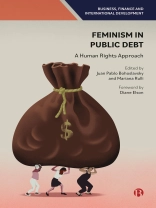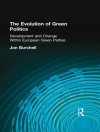EPDF and EPUB available open access under CC-BY-NC-ND licence.
As many developing countries are facing increasingly higher levels of debt and economic instability, this interdisciplinary volume explores the intersection of sovereign debt and women’s human rights.
Through contributions from leading voices in academia, civil society, international organizations and national governments, it shows how debt-related economic policies are widening gender inequalities and argues for a systematic feminist approach to debt issues.
Offering a new perspective on the global debt crisis, this is an invaluable resource for readers who seek to understand the complex relationship between economics and gender.
Cuprins
Foreword – Diane Elson
1. Introduction: Feminist sovereign Debt: Utopia or Oxymoron? – Juan Pablo Bohoslavsky and Mariana Rulli
PART I: Debt and Feminist Agendas
2. Debt, Economic Violence And Feminist Agenda – Corina Rodríguez Enríquez
3. Debt, Development and Gender – Penelope Hawkins and Marina Zucker-Marques
4. Debt and Climate Change: Twin Crises Burdening Women in the Global South – Iolanda Fresnillo Sallan and Leia Achampong
PART II: Human Rights and Debt Approach
5. Legal Standards on Debt and Women’s Rights – Juan Pablo Bohoslavsky and Julieta Rossi
6. Letter from UN Special Procedures to the IMF (2022)
7. Impact of Debt on Women’s and Girls’ Human Rights – Introduction to the 2023 Report of the UN Working Group on Discrimination Against Women and
Girls, ‘The Gendered Inequalities of Poverty: Feminist and Human Rights-Based Approaches’ – Dorothy Estrada-Tanck
8. Debt and Human Rights in the World and Regional Conferences on Women in Latin America and the Caribbean – Marita Perceval and Mariana Rulli
PART III: International Financial Institutions, Gender and Diversity
9. Gender Mainstreaming at the International Monetary Fund – Camila Villard Duran
10. Why are Neoliberal Policies Machistas? – Diane Perrons
11. Continuity of the IMF’s Androcentric Policies Before, During and After the Pandemic: The Case of Latin America – Alicja Paulina Krubnik
PART IV: IMF, Women and Diversities in Latin America and Argentina
12. Life Sustainability and Debt Sustainability. Care in the Centre – María Nieves Rico
13. Where a Right Fails, a Debt Increases: Gender Inequalities and Economic Vulnerability of Women and LGTBQ+ Groups – Florencia Partenio and Ariel Wilkis
14. Debt and the Right to Education in Latin America and the Caribbean – Francisco Cantamutto and Agostina Costantino
PART V: Gender Impact Analysis: Frameworks and Experiences
15. Debt Sustainability Analysis: Life After Capital: A View from Feminist Economics – Patricia Miranda and Verónica Serafini Geoghegan
16. Measuring and Managing Gender Equality: The Case of Gender Budgeting in Austria – Ulrike Marx
17. Rights, Gender and Progress Indicators: The Debts of Democracy – Flavia Marco Navarro and Laura Pautassi
PART VI: Work Agenda for Egalitarian Transformations
18. A Gender Lens for the International Monetary and Financial System: Truly Feminist Reforms Needed – Christina Laskaridis
19. Gender Bonds: Do They Leverage or Threaten Women’s Rights? – Juan Pablo Bohoslavsky and Lena Lavinas
20. Institutionalization of the Gender Approach in Public Finances: How to Strengthen – Rather than Dilute – Feminist Demands? – Magalí Brosio and Mariana Rulli
Despre autor
Mariana Rulli is Senior Researcher and Professor of Political Science at the National University of Rio Negro (CIEDIS).












